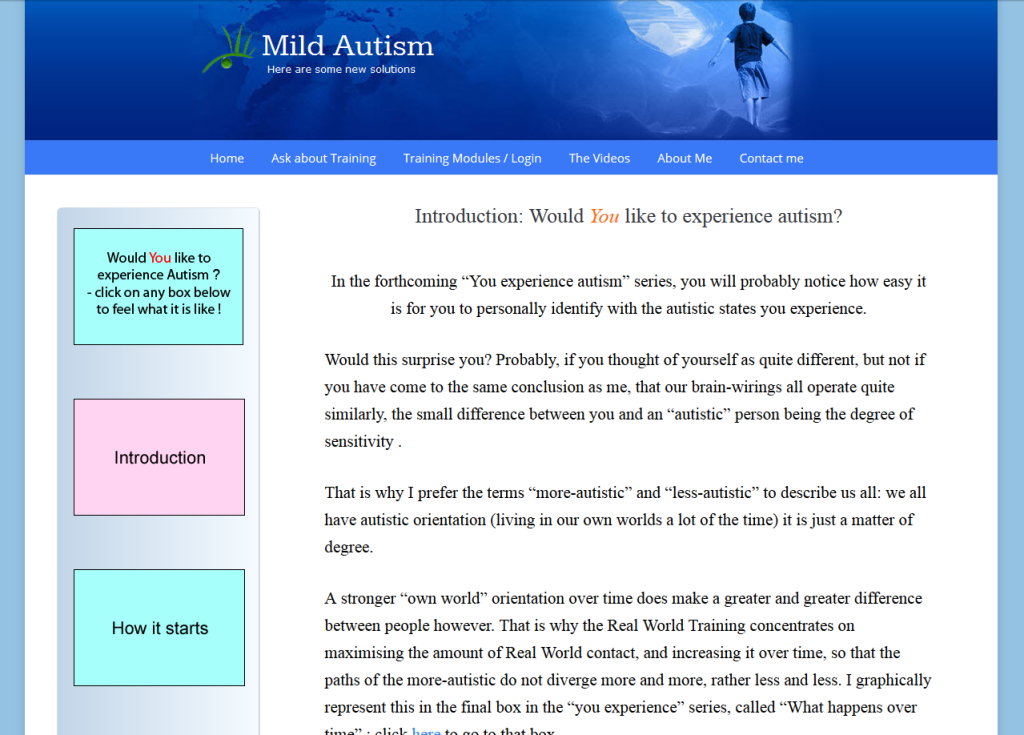.
I hope you are getting new insights
from seeing and feeling the world in the way your Loved One does.
I wanted to help you FEEL what it is like, to “live the part”.
And to realise that you and your Child feel the same things,
we are not as different as ‘experts’ may have led you to believe!
If you haven’t read the “You experience Autism” series
on the Home page of Mild-Autism.com,
click on this line to go there
It gives you a better perspective, doesn’t it!
And hopefully inspires you to more compassion,
and inspires you
to connect with your Child in new ways !
I welcome any thoughts and comments you would like to share with our small
but motivated community of Parents and Carers.

3 replies to "Introduction to the “YOU experience Mild-Autism” Series"
It is good to experience more of my child’s world through your examples, thank you.
Hi Pete!
We found a psychologist who attended the start-up Son-Rise program. We are cooperating with her plus a speech therapist and an ergo therapist.
There is something that is bothering us. The psychologist is not sure that our loved one is autistic. She is closer to believe that she has other disorder such as dyspraxia or SLI. How can we find out what is the right diagnosis (No doctor gave us a diagnosis)? Is the age of the child the critical factor? One thing that I worry about is that our girl (I’m not 100% sure) does not understand whole sentences or dialogues but words or phrases. Is this normal on autism or an indication that something else is going on? How can we discriminate these? I know that you are not a doctor but you may help us with your knowledge and experience. I am waiting for your answer!
Hi Anastasia,
based on that information, to me it would seem she at least demonstrates
many of the classic autism traits.
Your psychologist seems to be adding another aspect, dyspraxia,
to do with co-ordination, where messages from the brain are not always
being interpreted accurately by the body.
Also does your Child have low muscle-tone? These symptoms are consistent
with classic autism as well.Pre-school physical programmes,
like in Australia “Gymbaroo” may offer good training in the physical area.
To me, from a distance, I would not be concerned about differentiation
– autistic, non autistic, to me they are basically sterile distinctions.
To me, I am not overly-concerned about trying to find precise labels
– the term “autistic” covers a range of conditions and behaviours
Autism by my definition is broadly that the person “is more in
Own World than most”, and your little girl thereby qualifies under
that broad description. All the behaviours you describe in your message
also fit under that definition of autism.
More importantly, we focus on Results: by undergoing a system
of training that encourages the Child more into the Real World,
huge improvements are made to the person’s brain’s function and
the person’s understanding of,and interaction with, the Real World.
And yes that also means improvements in co-ordination too.
I would be most pleased to correspond with your psychologist,
since she demonstrates already a similar point of view to mine,
having undertaken the Son Rise programme, which demands a large
investment of time and money, not something taken lightly.
If she faithfully undertakes the essence of that programme with your
youngster then you are in good hands.
Where Real World Training differs from Son Rise is mostly in preparation.
We spend more time making sure the person is in a receptive state to be trained,
which sometimes means leaving that person in Own World as ‘not ready right now’.
A well-known and well-regarded autistic author with whom I correspond,
called Donna Williams, describes being dragged unwilling from Own World
as giving her “Psychic Scars”. I wish to avoid such things via the Training.
The other difference is in providing lots of Relax time after Real World entering.
A big effort may have been made, and that needs to be recognised and respected,
sometimes appropriately rewarded, but above all given quiet time to recover.